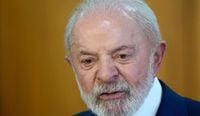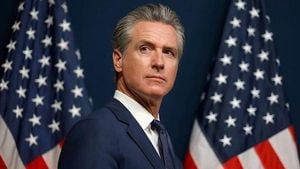Diplomatic tensions between Brazil and the United States have reached a new high this week, as Brazil’s Health Minister Alexandre Padilha announced he will not attend the United Nations General Assembly in New York due to what he called "unfounded and arbitrary limitations to Brazil’s diplomatic exercise"—a reference to strict visa restrictions imposed by the Trump administration. The move comes as both countries navigate a growing rift that has spilled into the international spotlight, affecting not only bilateral relations but also broader multilateral cooperation at the UN.
According to the Associated Press, Padilha, a close ally of President Luiz Inácio Lula da Silva, was expected to participate in the UN General Assembly, a key global forum for diplomatic engagement. However, he received a U.S. visa that limited his movement in New York to the UN headquarters and a few blocks near his hotel. In a pointed statement, Padilha declared, "They might stop the minister from being present, but the defense of science, vaccines (will go forward). This U.S. president will not be able to stop it." His words, broadcast by TV GloboNews, underscored Brazil’s determination to maintain its international presence despite U.S. obstacles.
The Brazilian government swiftly responded to the visa restrictions by submitting an official protest to the United Nations. In a letter addressed to UN Secretary-General António Guterres, Brazil argued that the U.S. decision violates Article 105 of the UN Charter and the Convention on Privileges and Immunities, both of which guarantee freedom of movement for government officials attending UN events. The letter further highlighted UN General Assembly resolution 43/48, which obliges the host country to ensure unhindered access for all delegations, regardless of their political affiliations or positions.
Brazil’s concerns extend beyond Padilha’s individual case. As reported by CNN Brasil and corroborated by two Brazilian officials who spoke on condition of anonymity, the Lula administration fears that similar restrictions could be applied to other members of the Brazilian delegation. The official protest to the UN reflected a broader anxiety about the potential for escalating diplomatic incidents, especially in light of the increasingly fraught relationship between the two countries.
Neither the United Nations nor the U.S. government has commented publicly on the dispute. Yet the silence has done little to quell the controversy. The situation has been further inflamed by Brazil’s decision to exclude the United States from the second forum "In defense of democracy and against extremism," which will convene in New York during the General Assembly. Organized by President Lula alongside the leaders of Chile, Spain, Colombia, and Uruguay, the forum is expected to draw representatives from about 30 countries. Last year, under President Joe Biden, the U.S. attended the forum’s inaugural session. This year, however, the U.S. was not invited—a decision attributed, according to CNN Brasil, to the policies of President Donald Trump, who has questioned Brazilian democracy and attacked key institutions such as the electoral and judicial systems.
Underlying these diplomatic maneuvers is a dramatic deterioration in U.S.-Brazil relations. The downward spiral accelerated in July 2025, when the U.S. Treasury Department imposed sanctions on Brazilian Supreme Court Justice Alexandre de Moraes. Citing the Global Magnitsky Human Rights Accountability Act, Washington accused de Moraes of illegally prosecuting former President Jair Bolsonaro, ordering the freezing of any assets he may have in the United States. The sanctions, according to the U.S. Treasury, were justified by alleged human rights abuses and corruption.
The sanctions came on the heels of a series of punitive economic measures. On July 30, President Trump introduced an additional 40% tariff on Brazilian imports, bringing the total tariff rate to a staggering 50%. This was a direct response, as reported by multiple outlets, to the Brazilian Supreme Court’s verdict sentencing former President Bolsonaro to 27 years in prison for attempting to overturn the 2022 presidential election results and for an alleged attempt to assassinate President Lula. Trump, who has openly supported Bolsonaro and criticized the current Brazilian administration, described the trial as a "witch hunt"—a characterization that Lula strongly rejected in a New York Times op-ed published on September 21, 2025. "Brazil’s democracy and sovereignty are not on the table," Lula wrote, emphasizing his pride in the Supreme Court’s "historic decision" to safeguard Brazil’s institutions and democratic rule of law.
The diplomatic standoff has also taken a personal toll on Brazilian officials. In June, Padilha’s wife and 10-year-old daughter had their U.S. visas revoked, a move linked to Trump’s broader policy of restricting visas for Cuban and foreign officials involved in Cuba’s medical missions. Brazil, under former President Dilma Rousseff (2011-2016), had operated a program that hired thousands of Cuban doctors—a program in which Padilha himself played a key role as health minister.
Meanwhile, the U.S. government’s actions have prompted Brazil to remind the international community of the host country’s legal obligations. The letter to Secretary-General Guterres cited UN General Assembly resolution 43/48, emphasizing that the United States, as host, must provide all delegations with unlimited access regardless of their political stances. The Brazilian government’s insistence on these principles signals its intent to defend not only its own interests but also the norms underpinning multilateral diplomacy.
As the UN General Assembly convenes in New York, the absence of Brazil’s health minister and the exclusion of the U.S. from the democracy forum serve as stark reminders of the broader political and ideological battles shaping global diplomacy. The strained relations are not limited to the corridors of power; they have real-world consequences for policy, trade, and international cooperation. For instance, the 50% tariff on Brazilian exports imposed by the Trump administration has dealt a heavy blow to Brazil’s economy, further deepening the rift between the two countries.
Adding to the complexity, former President Bolsonaro, now convicted and sentenced, has been diagnosed with skin cancer, according to reports. His legal troubles and health issues continue to cast a shadow over Brazil’s political landscape, fueling debates both at home and abroad.
Despite these setbacks, Brazil’s leaders remain resolute. "Brazil’s international activities will continue," Padilha affirmed, underscoring the country’s commitment to its global responsibilities—whether in science, public health, or the defense of democracy. As the world’s diplomats gather in New York, the tensions between Brazil and the United States are a vivid illustration of how domestic politics, legal battles, and international law can intertwine to shape the future of global engagement.
With diplomatic norms under strain and both countries digging in their heels, the coming weeks may determine whether this standoff is a passing storm or the start of a more enduring realignment in the Western Hemisphere’s diplomatic order.




